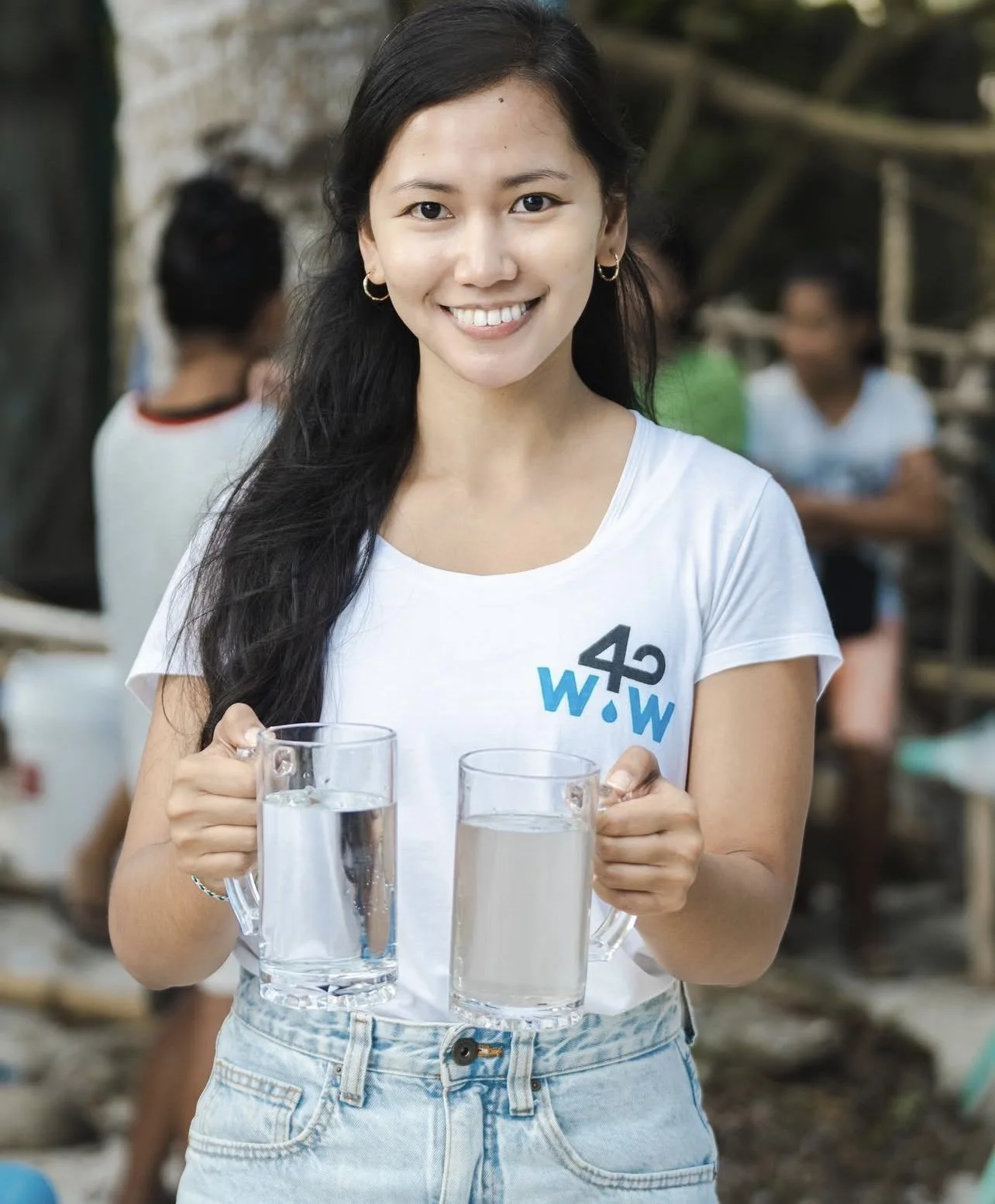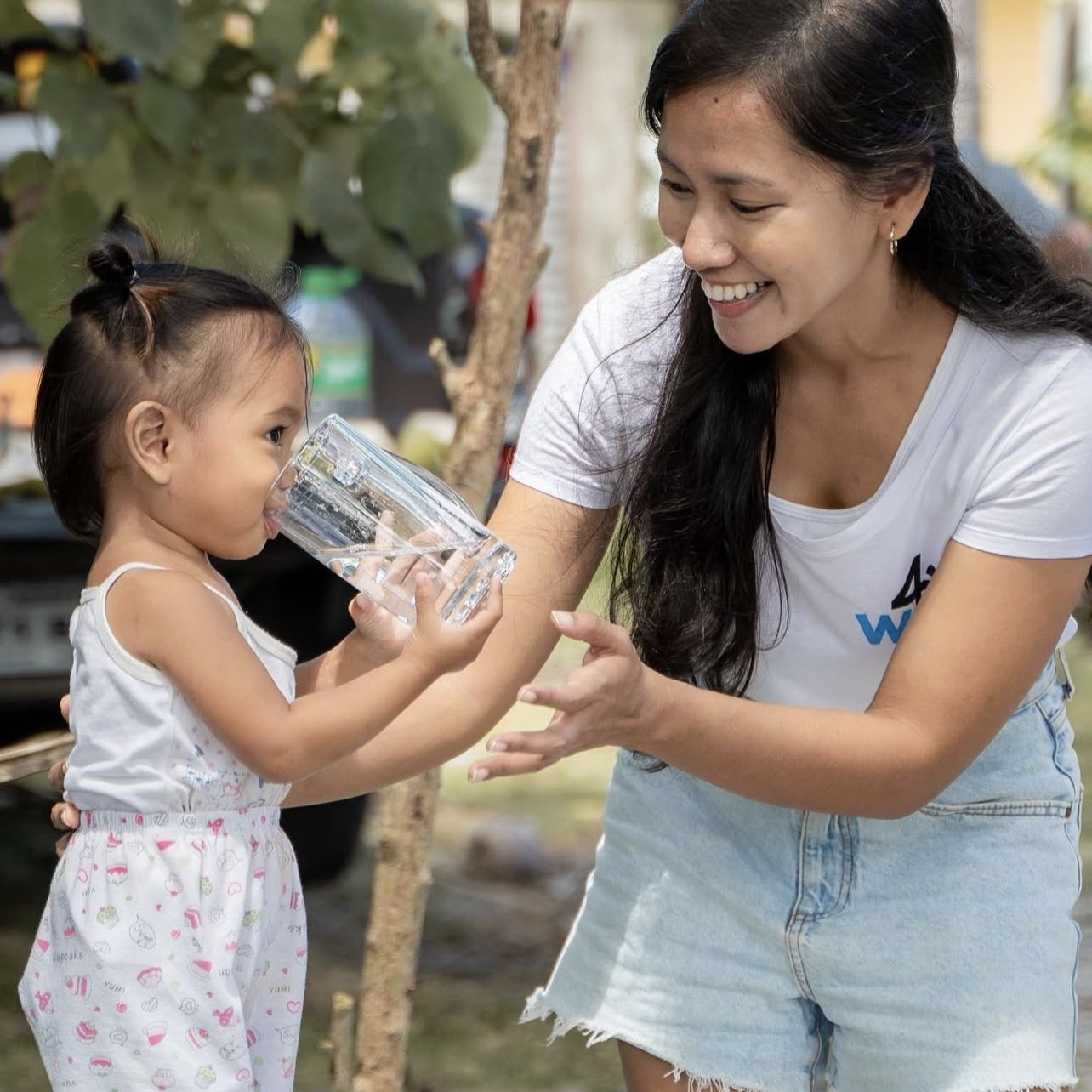Jenica Dizon-Mountford: A Thirst For Serving Others
Consuming water from bottles or from water dispensers has become the norm for most urbanites in places like metro Manila, where city dwellers generally don’t trust drinking tap water. That doesn’t mean they don’t have access to clean, safe drinking water. They do, unlike 40 million Filipinos who still lack access to clean water – especially in provincial towns and villages scattered around the country.
Some 74% of people in the world have access to safely managed drinking water. But there are still two billion humans (one in four people) who don’t.
Let that sink in for a while as you open that chilled bottle of Evian.
Unsafe water is responsible for more than a million deaths each year globally. Lack of access to safe water sources is a leading risk factor for infectious diseases, including cholera, diarrhea, dysentery, hepatitis A, typhoid, and polio. It also exacerbates malnutrition and, in particular, childhood stunting.
“Water is the foundation of everything – health, education, livelihoods. Without clean water, communities cannot thrive,” says Jenica Dizon-Mountford, Philippines Country Director of NGO Waves For Water (W4W), an international body focused on correcting imbalances of water scarcity in developing communities around the world.
Growing up, her parents instilled in her that privilege was a means of uplifting others. She grew up watching them work in the service of often overlooked and underserved communities. Being grounded by the values she learned early on as well as her Christian faith helped frame an aspiration to contribute to something bigger than herself.
“My mom was a doctor who would go on a lot of medical missions. I understood from a young age that our family had a lot of privilege and we needed to use that to uplift others, communities, or whoever that we had the capacity to help,” she says.
Small wonder that she was always looking to get involved in something. Whenever she got some spare time, she would gladly do volunteer work.
‘Finding Nemo’ reflections
Born and raised in the archipelagic Philippines, Jenica’s family loved the ocean so much that she started scuba diving when she was only nine years old. It was a family activity that they did together, which presented opportunities to travel around the Philippines. Perhaps it was at this young age that her interest in marine life began taking shape.
“The ocean was really my first advocacy, marine conservation. I love fish. I would advocate for the sharks, dolphins etc. And for quite a while, especially when I was still in college, I worked with a lot of marine conservation groups,” she says. “In 2015 I had a chance to volunteer for W4W Philippines. I never would have imagined I would end up running it.”
In September 2016 when super typhoon Ferdie (international name Meranti, the year’s most powerful cyclone) ravaged several regions in the Philippines, Jenica had a chance to go and lead a W4W disaster response mission in Batanes, a group of islands located at the northernmost province of the country that’s known for being highly susceptible to typhoons due to its geographical position and exposure to the Pacific Ocean.
The Batanes mission tipped the scale for Jenica to focus and be staunchly committed to continue doing clean water access advocacy. She remembers it like it was yesterday.
“We were waiting at the port for transport to move to another island. There were fishermen fishing, and I happened to casually ask what kind of fish was caught for the day. They showed fish in their sacks… what I saw were species that were the characters in ‘Finding Nemo’ movie like Dory, a blue tang fish. I was shocked that they were catching them because, you see, the Philippines contributes to the wild reef fish trade.”
Wild reef fish trade is a global industry fueled by high demand, involves the capture and trade of fish from natural habitats, with a significant portion of this trade impacting food security and livelihoods in coastal communities, while also potentially driving overexploitation and environmental degradation.
Like in ‘Finding Nemo’ where people thought the fish characters would make a nice addition to their aquarium, Jenica assumed that the fishermen’s Dory would be for sale.
“When I asked them how much the fish Dory cost, they said they weren’t selling it. They’ll eat it for their next meal,” recalls a shocked Jenica.
Typhoon Ferdie may have just passed the Philippines but there was another typhoon coming so the fishermen went out to sea to catch as many fish as possible (including Dory) to feed their families.
“That was very humbling for me. I realised I had such a myopic view of development. That conversation with the Batanes fishermen made me reflect about my privileged life. I realised then that I cared more about the fish than the people!” she says. “At the end of the day, it’s people that matter. I felt ashamed of myself because I was assuming they were going to sell the fish… I cared more about the fish, but didn’t think about their welfare.”
Another realisation is that it was really hard to campaign on paper – climate change, marine conservation – all these really huge issues that we want to communicate to people may be illegal, potentially destructive… but these are things that put food on the table for these families. How can she meet their basic needs when she doesn’t have any alternative to offer?
“My background in marine conservation, environmental policy, and sustainability made me realise that water is at the heart of both environmental and human well-being,” says Jenica, who earned a Master’s Degree in Water and Sanitation Development from Cranfield University in the UK in 2018.
“I saw firsthand in Batanes how the absence of clean water turns crises into humanitarian emergencies. That’s when it became clear: clean water wasn’t just an advocacy; it was a basic human right that I needed to fight for.”
Riding the waves
Jenica started catching the waves with the tenacity and focus of a surfer moving forward past the breakers and into rising swell and accelerating up to speed.
“When I became Waves For Water Philippines’ Director of Operations in my early 20s, one of the biggest hurdles was being taken seriously – especially in high-level discussions with policymakers, corporate partners, and seasoned development professionals. There was always an assumption that I lacked experience or authority simply because I was young,” she recalls.
“On top of that, WASH (Water, Sanitation, and Hygiene), especially in the engineering context, is a very male-dominated field. Working with the government meant primarily engaging with male leadership, especially in local government units. It was clear early on that I had to navigate spaces where decision-making power wasn’t always used to hearing from young women in leadership.”
There was pressure early on to prove her legitimacy, that she belonged in the humanitarian space despite her youth and non-traditional background.
“But I never felt the need to position myself as a trailblazer. Instead, I leaned into my role as a bridge, a connector – someone who helps sustain, scale, and refine existing solutions rather than creating entirely new ones,” she says with pride.
Over time, people stopped seeing her age and started seeing the expertise, the commitment, and the results. She was slowly getting recognised.
“What also helped me break through was learning how to position our work as a shared effort, rather than a singular initiative. Instead of trying to prove myself, I leaned into collaboration – framing every conversation around how working together would strengthen their existing work and responsibilities. I made sure that the service, the impact, and even the recognition were always shared.”
Being a part of Women of the World (WOW) also encourages her to keep moving forward in her work. WOW is a global all-women community advocating “She For She” alliance since 2022.
“With my fellow alumni cheering me on, it keeps me inspired to carry on,” she says. “The WOW group and one-on-one coaching sessions helped me unpack the tension I’ve been feeling during this major life transition after a recent relocation. The conversations gave language to my emotions, helped me identify limiting beliefs, and offered tools to reframe this season as part of a deeper alignment with my purpose. WOW gave me space to reflect and approach both my work and evolving identity with grace.”
Scale of impact
“Wave For Water founder Jon Rose always says that while the world faces many crises, clean water access shouldn’t be one of them because it’s a solvable problem,” she says, adding that it would take a multi-layer approach to unsafe water safe and fit for human consumption. Jenica outlines what’s needed to get there:
· Decentralized solutions. We can’t always wait for large-scale infrastructure. Point-of-use filtration systems, rainwater catchments, and community-led interventions are practical, and provide, immediate impact.
· Better governance. Water access should not be dictated by geography or politics. Stronger policies and localized decision-making can improve sustainability.
· Community empowerment. True impact happens when communities are trained and equipped to maintain their water solutions.
Jenica considers “the scale of impact” as W4W’s best achievement since she took on the country leadership role nearly five years ago.
“We’ve reached every province in the Philippines, impacting over two million people. Another milestone is seeing Waves For Water Philippines become self-sustaining, with local fundraising and partnerships instead of relying solely on international aid. But beyond the numbers, my proudest moments are the full-circle stories – like revisiting communities years later and seeing that the solutions we implemented are still working, still changing lives,” she beams.
Despite the big feat, Jenica remains quietly humble. It’s hard to believe that this petite woman sitting in front of me during our interview is a dynamo that made and continues to make waves in her chosen career path, which became the foundation of her advocacy.
Prior to W4W she admits that she’d always taken a supporting act role, grateful to continue and build upon the work that’s been done before her.
Safe water advocacy didn’t start as a “purpose” for Jenica. Always drawn to meaningful work that contributes to something bigger for the greater good, she thought at first it meant marine conservation, then sustainability, then policy.
Over time, she realised that all these things connected back to water, and more importantly, to people. So while she didn’t set out to work in water advocacy, Jenica followed where she could be of most use, and that’s what led her to W4W.
“Working with Waves For Water resonated with me – it wasn’t about reinventing the wheel but strengthening and expanding what was already working,” she says. “But I also know I won't always be in this space – I just know what I want to do. I’ve been grateful to continue and build upon the work that’s been done before me because I believe in progress that’s built upon listening and collaboration, not necessarily pioneering.”
No matter what the next “space” would be for Jenica, her deeply rooted sense of service-to-others will shine a light on her path.
Debbie | ws
Images source: Jenica Dizon-Mountford and Waves For Water)
Waves For Water Philippines | About Waves For Water | IG @jenicadizon | LinkedIn Jenica Dizon-Mountford | Women of the World










